CHAPTER 5
Hurt and Disappointment
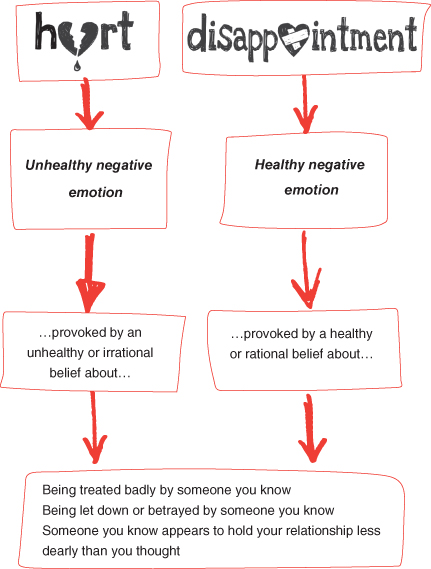
We will focus on some common triggers for hurt that we’ve observed in our private practice.
Hurt
Hurt is felt strongly in significant relationships, i.e. family, intimate relationships, friendships, work situations. It is not usually experienced with strangers, though it can happen. Hurt is about the theme of care, love and consideration. What you feel hurt about can vary within the various relationships you have because you will hold different expectations about how you want to be treated within each. You may feel hurt if a close friend asked another mutual friend to go on holiday with them instead of you but you may not feel hurt if your manager asked another colleague of yours to lead a project instead of you, you might feel relief.
Some people feel predominantly hurt whilst others feel a number of different emotions alongside their feeling of hurt. In Chapter 3, for example, we mentioned ‘anger hurt’, where anger is, usually, experienced when you put down the person who has treated you badly and hurt is, usually, felt when you put yourself down. You can also experience anger hurt without damning the other or yourself but when you feel like your bad treatment is unbearable. In our clinical practice we find anger hurt is felt predominantly when you put the other person down for treating you badly but you also put yourself down, as you think the reason you were treated badly was because you are unworthy or unlovable.
Example: Anger Hurt
The first unhealthy belief triggers anger; the second triggers hurt.
Associated with hurt are thoughts about not deserving the bad treatment. Whether we deserve something or not is purely subjective. The idea behind ‘deserving’ is based on reciprocity; if I treat someone well and with consideration then I ‘deserve’ to be treated the same way. Unfortunately, there is no such Law of the Universe. Life and people do not operate in this manner. It would be great if we were always considerate, thoughtful and treated one another with care but sadly this is not reality. It is more helpful for us to think that even if we treat someone well, it does not follow that the same MUST happen back to us, even though we’d strongly prefer it.
Meta-emotions of Hurt
A meta-emotion is an emotional problem about an emotional problem. For example, you can feel anxious about feeling hurt, depressed about feeling hurt, angry with yourself about getting hurt and shame or embarrassment about feeling hurt. You will know if you have a meta-emotion about your hurt feelings by asking yourself ‘how do I feel about my hurt feelings?’
Anxiety about Hurt
Anxiety about hurt is provoked by the unhealthy belief ‘I must not feel hurt’ because feeling hurt is awful, unbearable or proves that I am worthless (or some other form of self damning belief). It is possible to have these three derivative beliefs or any combination of them. If you feel anxious about feeling hurt then you will need to work through these feelings of anxiety as well as feelings of hurt. You can refer back to Chapter 1 if you want to work on your feelings of anxiety first.
Depression about Hurt
Depression about hurt is provoked by the unhealthy belief ‘I absolutely should not be feeling hurt’ or ‘I absolutely should not have been hurt again’ or ‘I absolutely should not have allowed myself to get hurt again’, the fact that I did is awful, unbearable and proves I am a failure (or some other form of self damning belief). It is possible to have these three derivative beliefs or any combination of them. If you feel depressed about your hurt feelings then you will need to work through these feelings of depression as well as your feelings of hurt. You can refer back to Chapter 2 if you want to work on your feelings of depression first.
Anger about Hurt
Self anger about hurt is provoked by the unhealthy belief ‘I absolutely should not be feeling hurt’ or ‘I absolutely should not have allowed myself to get hurt again’, the fact that I did is awful, unbearable and proves I’m a weak person (or some other form of self damning belief). It is possible to have these three derivative beliefs or any combination of them. If you feel anger about your hurt feelings then you will need to work through these feelings of anger as well as your feelings of hurt. You can refer back to Chapter 3 if you want to work on your feelings of anger first.
Shame about Hurt
Feeling shame or embarrassment about your hurt feelings is provoked by the unhealthy belief ‘People I know must not think I’m an idiot for feeling hurt’ or ‘People I know must not judge me negatively because I feel hurt again’ or ‘People I know must not judge me negatively because I’ve allowed myself to get hurt again’, if they do it would be awful, unbearable and prove they are right that I am an idiot (or some other form of self damning belief). It is possible to have these three derivative beliefs or any combination of them. Shame and embarrassment are provoked by unhealthy beliefs that something shameful has been revealed about you. If you feel shame about your hurt feelings then you will need to work through these feelings of shame as well as your feelings of hurt. You can refer to Chapter 7 if you want to work on your feelings of shame first.
Common Hurt Triggers
The following are common triggers of hurt – it is not an exhaustive list. Tick the boxes that you think apply to you.
| Tick the box to identify your hurt triggers |
 Insulted Insulted |
 Offended Offended |
 Let down Let down |
 Betrayed Betrayed |
 Treated badly Treated badly |
 Treated insensitively Treated insensitively |
 Not listened to Not listened to |
 Broken promise Broken promise |
 Rejected Rejected |
 Excluded Excluded |
 Ignored Ignored |
 Lack of care Lack of care |
 Lack of attention Lack of attention |
 Dismissed Dismissed |
 Not being number one in someone’s mind Not being number one in someone’s mind |
 Not being the most significant other with
someone Not being the most significant other with
someone |
 Tone of significant other’s voice Tone of significant other’s voice |
 Lack of reciprocity Lack of reciprocity |
 Thoughtlessness Thoughtlessness |
 Not treated in exactly the same way Not treated in exactly the same way |
 Other (write your own reason) Other (write your own reason) |
Am I Hurt or Disappointed?
At the heart of your hurt feelings are unhealthy beliefs about being treated badly, let down or betrayed by someone (and you think you do not deserve such treatment) and/or they are provoked by an unhealthy belief about someone who appears to hold your relationship less dearly than you thought. Unhealthy beliefs that provoke hurt have a consequence on how you think (cognitive consequences), act or tend to act (action tendencies). When you feel hurt, for example, your thoughts may be preoccupied with ‘being treated badly’ and how uncaring the other person has been. You may shut down all communication with the person responsible for your bad treatment or criticise them without telling them what you are feeling hurt about.
Assess if you are hurt or disappointed by checking your cognitive consequences and action tendencies.
Look through the illustrations for the cognitive consequences and action tendencies and work out if you are hurt or disappointed. It is important to put yourself in the trigger situation when you felt hurt. It is easy to think that you don’t have unhealthy beliefs and thoughts when you are not triggered or when you are away from the person who triggered your hurt feelings. Imagine yourself with the person in question and imagine the moment when you felt the emotional pain. Work out if the pain was hurt or disappointment.
Cognitive Consequences
Hurt
You overestimate the unfairness of the other person’s behaviour.
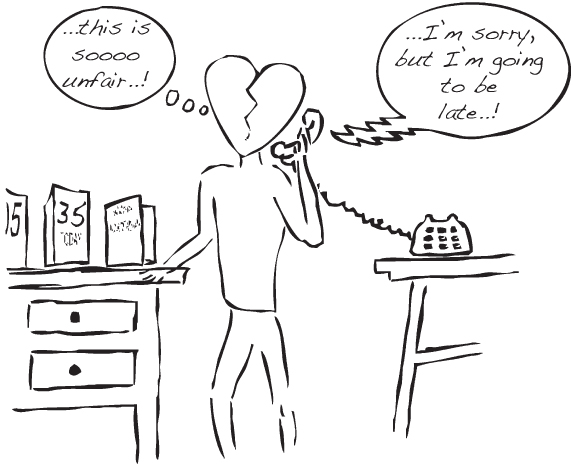
Cognitive Consequences
Disappointment
You are realistic about the unfairness of the other person’s behaviour.
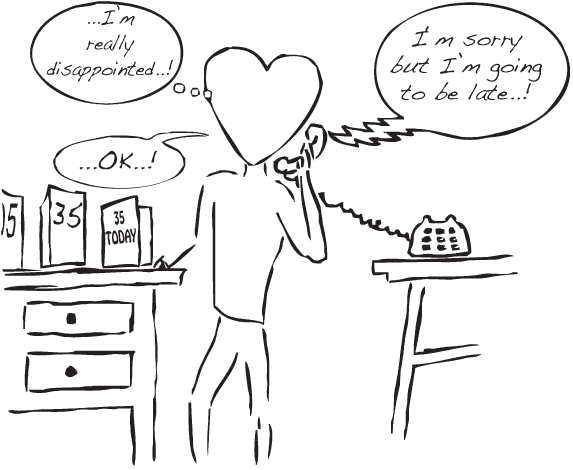
Cognitive Consequences
Hurt
You perceive others showing lack of care or indifference.

Cognitive Consequences
Disappointment
You perceive others as behaving badly rather than indifferent or uncaring.
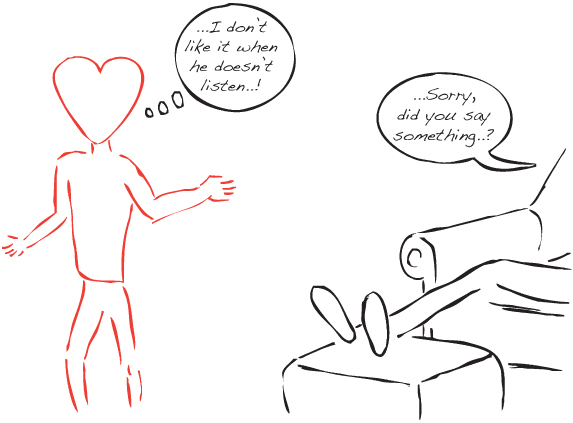
Cognitive Consequences
Hurt
You see yourself as alone, uncared for and misunderstood.
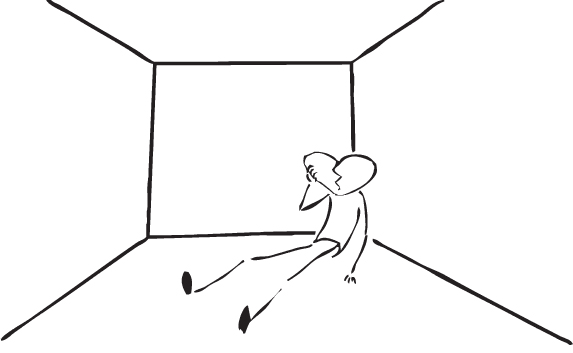
Cognitive Consequences
Disappointment
You do not see yourself as alone or uncared for.
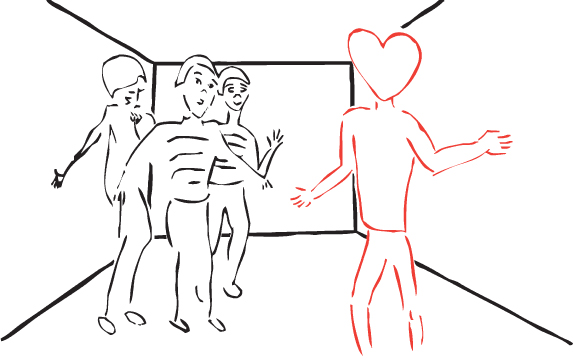
Cognitive Consequences
Hurt
You tend to think of past hurts.

Cognitive Consequences
Disappointment
You are less likely to think of past hurts.
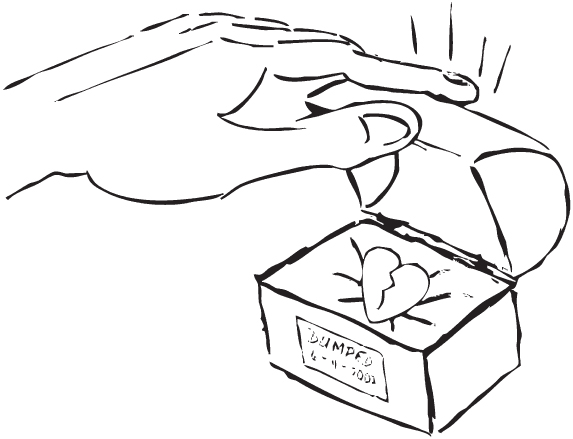
Cognitive Consequences
Hurt
You think the other has to put things right of their own accord first.
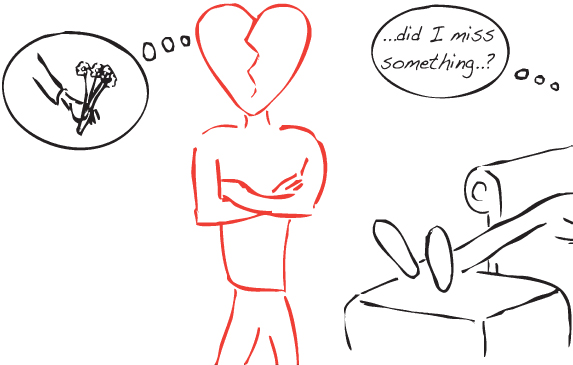
Cognitive Consequences
Disappointment
You do not think the other person has to make the first move.
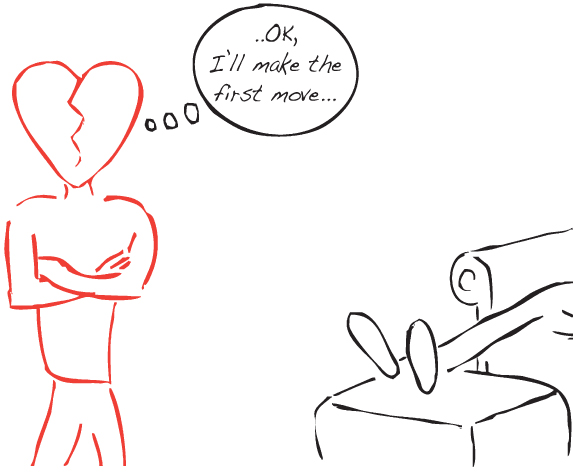
Action/Action Tendencies
Hurt
You shut down communication channels with the other person.
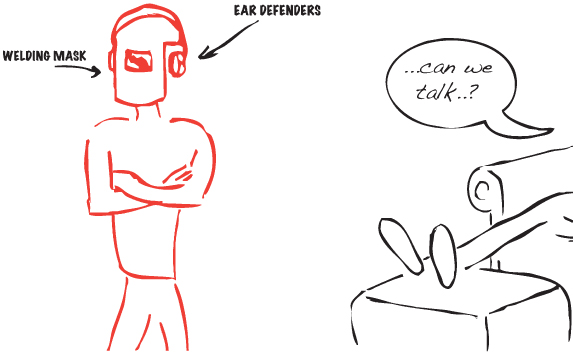
Action/Action Tendencies
Disappointment
You are able to communicate your feelings to the other person directly.

Action/Action Tendencies
Hurt
You criticise the other person without disclosing what you are hurt about.
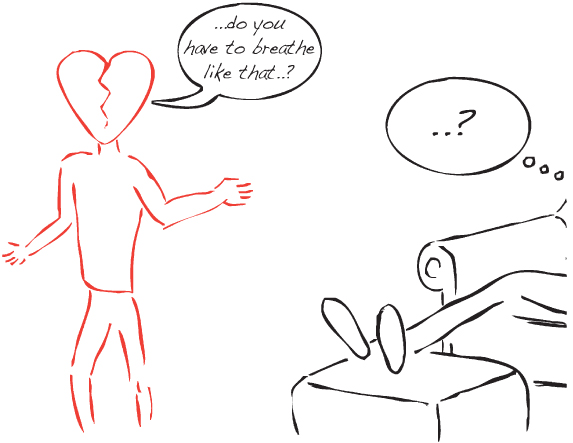
Action/Action Tendencies
Disappointment
You influence the other person to act in a fairer manner.
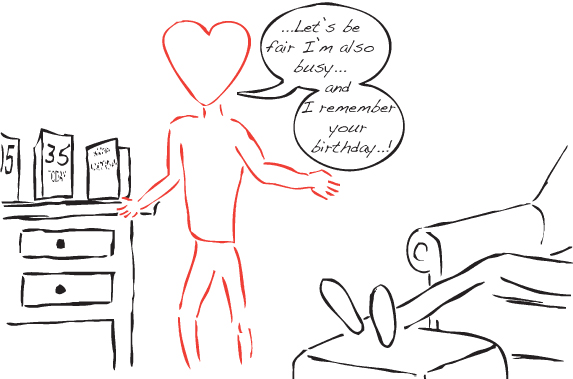
Now …
General Change or Philosophical Change for you?
General Change

Philosophical Change
Remember to take time if you are choosing this route, as Philosophical Change is about changing your unhealthy beliefs over the long term.
Remember, hurt is provoked by unhealthy beliefs about being treated badly, let down or betrayed by someone (and you think you do not deserve such treatment) and/or it is provoked by an unhealthy belief about someone who appears to hold your relationship less dearly than you thought.
An unhealthy belief is made up of absolutist rigid beliefs – MUSTs, HAVE TOs, NEED TOs, GOT TOs, ABSOLUTELY SHOULDs, from which three further derivative disturbed beliefs come.
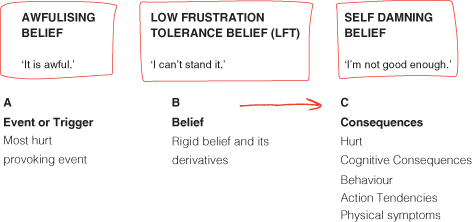
A rigid belief, at B, is a demand about the most hurt provoking aspect of an event – it is either a demand about how you absolutely should have been treated or a demand about how you absolutely should not have been treated.
For example, if what you are most hurt about was being spoken to in an insensitive manner, then the rigid belief is I should have been spoken to with respect or I absolutely should not have been spoken to in such an insensitive manner.
The fact your rigid demand was not met triggers any or a combination of the three derivative beliefs.

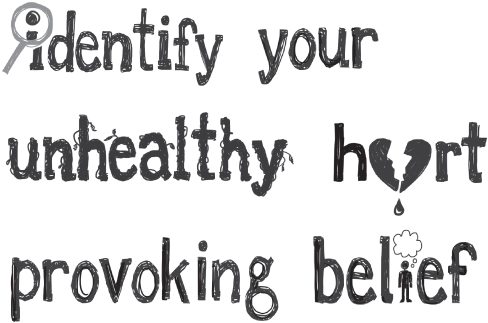


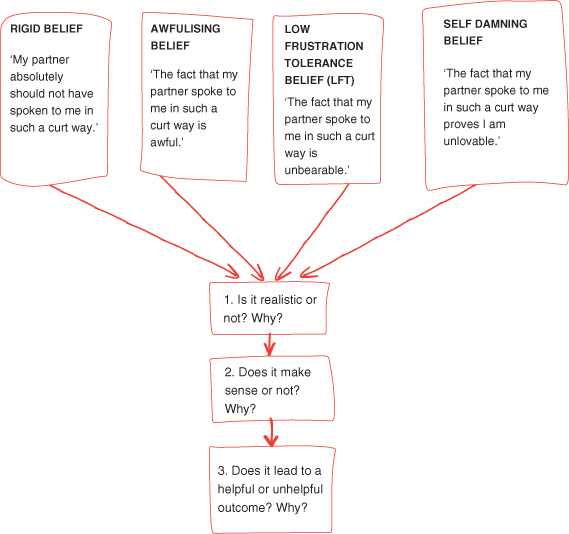
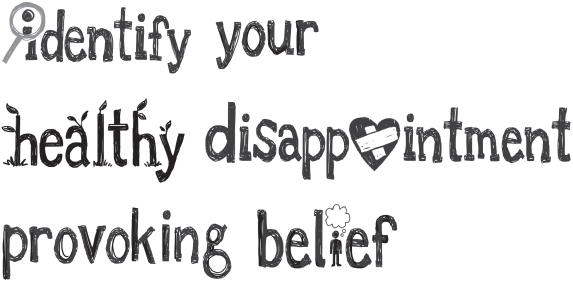
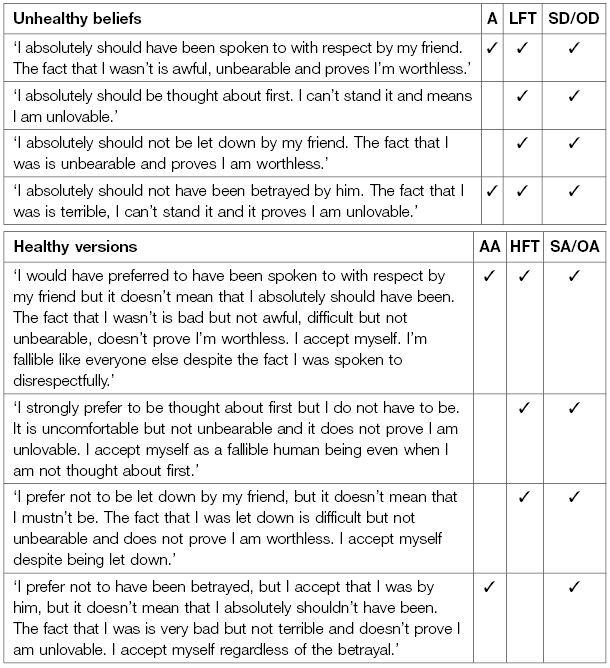
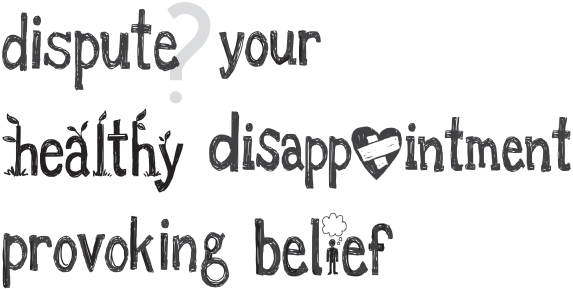
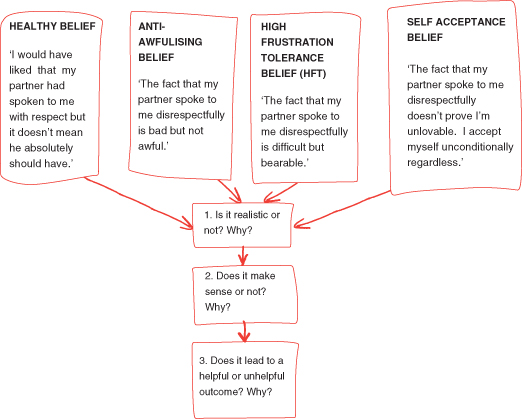
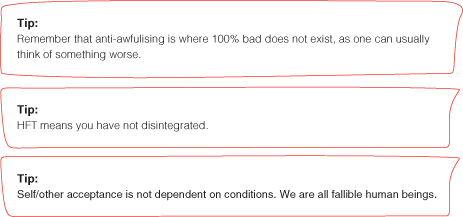
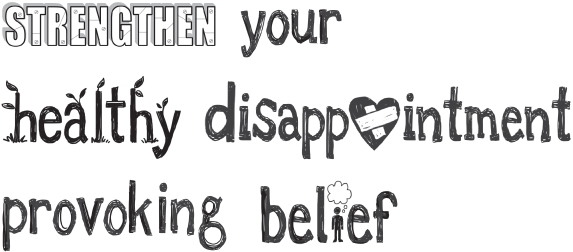

- Think and act in accordance with your healthy disappointment provoking belief repeatedly and consistently in a forceful manner until eventually your emotional state changes from hurt to disappointment.
- Remember your emotion of hurt will change – the new way of thinking and the new actions you will implement will feel uncomfortable initially but this is completely natural. You are changing an old habit of unhealthy thinking and old habitual hurt behaviours. It takes a few weeks of repetitions done consistently and forcefully.
- The behavioural goals you set for yourself need to be challenging but not overwhelming. If you overwhelm yourself then it defeats the object of the exercise.
- Start with imagining yourself thinking and acting in a healthy manner whilst being in the trigger situation until you think you are ready to challenge yourself in real life. For example, imagine yourself responding to your partner or friend by explaining that you feel disappointed about the way you have been treated and then asking them to treat you differently in the future.
- Repeat your healthy disappointment provoking belief in your head daily and particularly when you are imagining yourself in the trigger situation. This mental rehearsal will help you to remember it when you deliberately face the trigger situation in real life.
- Once you achieve your desired goal, whatever it is, then you need to maintain the helpful thinking and actions. For example, expressing your feelings in a balanced way rather than stopping communication altogether.
- Review how you did, each time you challenge yourself, and then work out what you can do differently or better the next time. Then do it. Do not demand perfection from yourself. The process of moving from hurt to disappointment is uncomfortable and uneven. Some days you will make bigger strides when you challenge yourself and other days you will make small strides or even take a step back. The important thing is to accept that this can happen and then bring your focus back to what you are doing and continue with it.
- Remember, you didn’t learn to drive a car, ride a bicycle or learn to read overnight, it takes repetition and focus and consistency.
Chapter 5 – Hurt – Takeaway Tips
The following are some general helpful tips for any type of relationship:
- Accept that you are responsible for your own emotions and actions.
- Communicate without pointing a finger or without shutting down, use expressions like, ‘I feel disappointed about the way you …’ and not ‘You caused me hurt …’
- Accept yourself as a valuable but imperfect human being, and think the same of your parents, relatives, brothers and sisters, friends and colleagues at work. Judge the way you have been treated rather than your worth.
- Be assertive and tell them about your hurt feelings, do not shut down communication with a significant other.
- Communicate your thoughts and feelings appropriately and not defensively. Being assertive means that you have the courage of your own convictions and that you can listen.